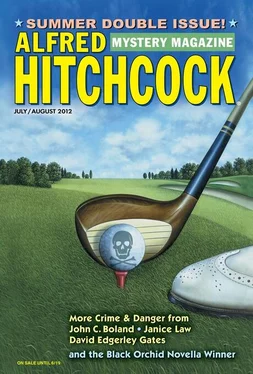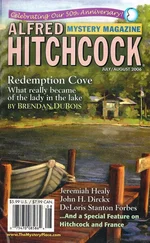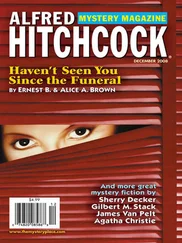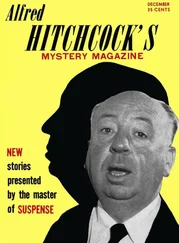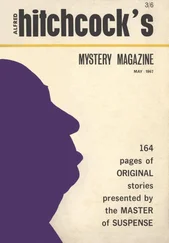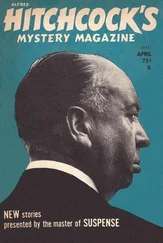Donald Moffitt - Alfred Hitchcock’s Mystery Magazine. Vol. 57, No. 7 & 8, July/August 2012
Здесь есть возможность читать онлайн «Donald Moffitt - Alfred Hitchcock’s Mystery Magazine. Vol. 57, No. 7 & 8, July/August 2012» весь текст электронной книги совершенно бесплатно (целиком полную версию без сокращений). В некоторых случаях можно слушать аудио, скачать через торрент в формате fb2 и присутствует краткое содержание. Город: New York, Год выпуска: 2012, ISBN: 2012, Издательство: Dell Magazines, Жанр: Детектив, на английском языке. Описание произведения, (предисловие) а так же отзывы посетителей доступны на портале библиотеки ЛибКат.
- Название:Alfred Hitchcock’s Mystery Magazine. Vol. 57, No. 7 & 8, July/August 2012
- Автор:
- Издательство:Dell Magazines
- Жанр:
- Год:2012
- Город:New York
- ISBN:0002-5224
- Рейтинг книги:3 / 5. Голосов: 1
-
Избранное:Добавить в избранное
- Отзывы:
-
Ваша оценка:
- 60
- 1
- 2
- 3
- 4
- 5
Alfred Hitchcock’s Mystery Magazine. Vol. 57, No. 7 & 8, July/August 2012: краткое содержание, описание и аннотация
Предлагаем к чтению аннотацию, описание, краткое содержание или предисловие (зависит от того, что написал сам автор книги «Alfred Hitchcock’s Mystery Magazine. Vol. 57, No. 7 & 8, July/August 2012»). Если вы не нашли необходимую информацию о книге — напишите в комментариях, мы постараемся отыскать её.
Alfred Hitchcock’s Mystery Magazine. Vol. 57, No. 7 & 8, July/August 2012 — читать онлайн бесплатно полную книгу (весь текст) целиком
Ниже представлен текст книги, разбитый по страницам. Система сохранения места последней прочитанной страницы, позволяет с удобством читать онлайн бесплатно книгу «Alfred Hitchcock’s Mystery Magazine. Vol. 57, No. 7 & 8, July/August 2012», без необходимости каждый раз заново искать на чём Вы остановились. Поставьте закладку, и сможете в любой момент перейти на страницу, на которой закончили чтение.
Интервал:
Закладка:
“I don’t care what you say,” insisted the other man, a roly-poly creature with thick glasses and a beak like a bird of prey. “Poison is much cheaper, and it’s permanent. What did you pay for that trap?”
“None of your beeswax,” retorted the man with the shears. “Anyway, it was worth it. Since I got that trap I’ve caught and relocated twenty-three of those little rascals.”
“In your dreams. I’m telling you, Ricedale, you trapped one squirrel twenty-three times. And every time you turned it loose up in the cemetery, it got back here before you did.”
“Excuse me,” said Auburn. “Mr. Ricedale?”
The man with the shears jumped as if a hornet had stung him on the back of his neck. “Yo! You got in under my radar. Help you, gentlemen?”
Auburn showed identification. “If you have a minute, we’d like to ask you a few questions about an incident that occurred here a couple of days ago.”
“What incident would that be?” asked Ricedale, his nasal voice seasoned with a tang of mockery.
“A birthday party for Mr. Rentz.”
“The late Mr. Rentz.” Ricedale nodded and pointed with his shears. “Tuesday afternoon, there on his deck. Vanilla ice cream, angelfood cake, chocolate pie. Wally and I were both there.”
Auburn turned to the other man. “Your name, sir?”
“Walter Snederle.”
Auburn thought Snederle looked vaguely familiar, but he decided the old man probably just represented a type of character — elderly, eccentric, slightly grotesque — that he’d seen portrayed dozens of times in movies and on TV.
He turned back to Ricedale. “You mentioned chocolate pie...”
“Only for the birthday boy. The rest of us had to settle for standard fare.”
“Some of you got standard fare,” said Snederle, in something like a whine. “I had a cup of coffee. Without.” He shook his left wrist until a metal bracelet identifying him as a diabetic slipped into view from under his cuff.
“Were either of you present when Mr. Rentz had an argument with his sons?”
“We both were,” said Snederle. “But I wouldn’t exactly call it an argument. They did all the talking, till Howard told them to shut up.”
“How well did you know Mr. Rentz?”
“Oh, we were bosom buddies.” When Snederle smiled, his moon face curdled into a blur of wrinkles and his upper lip retreated into the shadow of his monumental nose. “On days like this, Howard and I used to sit out on my patio in the afternoon drinking coffee and pretending it was scotch. And watching the squirrels and rabbits hop right past his weeds to eat my flowers.”
Ricedale had abandoned his pruning. “So you think somebody put the chill on old Howard?” he asked.
“We didn’t say that.”
“You don’t have to. Those rubber gloves say it for you.”
As they climbed back into Stamaty’s van, Auburn expressed the view that they were probably on a wild-goose chase.
“ You probably are,” concurred Stamaty. “I agree this doesn’t look much like a homicide. But I have to file a report one way or the other because after that second autopsy there won’t be much doubt that Rentz is dead.”
“Don’t you mean vitally challenged?”
The Dragnet theme, executed in a pungent electronic bleat, announced a call on Stamaty’s cell phone. “Nick Stamaty. They did, huh? I can’t blame them, considering how things went... I can do better than that. I’ll go see them.” After ringing off, he pulled over to the curb and parked.
“Corky says Rentz’s family are spitting mad,” he told Auburn, “because the hospital wouldn’t release their Dad’s remains to the funeral director. Sound like a good opportunity to shake them down?”
A check with headquarters informed Auburn that the city directory showed two Rentzes besides the late Howard. Both were listed (not quite accurately, it seemed) as owners-operators of Rentz Heating and Cooling.
Stamaty had formulated his policy of not calling ahead while employed, years before, as a police detective in a midwestern city riddled with violence and riven by warring criminal factions. Even nowadays, when working with law enforcement personnel on a possible homicide, he found the cost of gasoline wasted on futile trips more than offset by the occasional gain from a surprise visit.
Virgil Rentz and his wife Cary lived on Silverhurst Drive in an older residential neighborhood with mature trees and front yards just large enough to be a nuisance during the mowing season. The Rentzes were at home, seemingly holding a gloomy vigil over a late or much protracted lunch.
Stamaty introduced himself and Auburn with his habitual courtesy, sympathy, and authority. Auburn didn’t envy him the task of justifying to these people his interference in their funeral plans, but Stamaty handled it with aplomb.
“I’m sorry I didn’t have the opportunity to contact you before you made arrangements with the funeral director,” he said, “but I’m here now, and I’m ready to answer your questions.” He went on before they had the chance to ask any. “I don’t expect our investigation to delay your dad’s funeral by even one day.”
“What I don’t get,” said Virgil, “is what you’re investigating. Dad had a stroke, didn’t he?”
“Probably,” nodded Stamaty, “but there’s a chance that the stroke was caused by one of his medicines. If it was, then it’s the coroner’s responsibility to identify that as the cause of death.”
“You mean,” said Virgil’s wife, “like maybe the doctor or the drugstore made a mistake?”
“Those are possibilities. Or maybe your father-in-law took the right medicine in the wrong dosage. We just need to be sure before we close the case. We’d like to have a look around his house — check his medicine bottles, maybe look at the food in the kitchen, anything else that could give us a lead on the cause of death.”
“That’s okay with us,” said Virgil, “but you might have to break in. I haven’t had a key to Dad’s place for years, and I don’t think my brother has one either.”
“We’ll be checking with him.”
Stamaty’s mention of food seemed to have captured Cary’s attention. “Were you thinking he died from something he ate? We had a birthday party for him the day before he went to the hospital. We all ate ice cream and cake, but nobody else got sick.”
“What’s left of the ice cream and cake is right there in the kitchen,” said Virgil, “if you want to take samples.”
“We understand somebody brought a chocolate pie to the party,” said Auburn, “just for Mr. Rentz.”
They both froze as if an Arctic wind had swept over them. “No pie,” said Cary shortly. “Just ice cream and cake.” Virgil’s silence corroborated her statement.
Neither Auburn nor Stamaty chose to bring up the feud over control of the heating and cooling business.
Rentz’s older son Kevin and his wife Sheeba lived a couple of miles away in a condo in Black Lake Estates. A panel truck belonging to the heating and cooling business was parked in the driveway next to an imported compact.
This couple displayed considerably more hostility than the people Auburn and Stamaty had just left.And here Stamaty’s mention of checking on Howard Rentz’s medicine and food instantly raised the question of a homidical overdose.
Kevin Rentz had a short, stiff upper lip that left his front teeth exposed like those of a gopher. He said m’s, p’s, and b’s by bringing his lower lip against his upper teeth. “The doctor said Dad probably just broke a blood vessel and passed out,” he said. “But you’re saying he could have been poisoned?”
“Because if you’re thinking that,” said Sheeba, “your number-one suspect has to be Dad’s little friend Joy Lynn.”
Читать дальшеИнтервал:
Закладка:
Похожие книги на «Alfred Hitchcock’s Mystery Magazine. Vol. 57, No. 7 & 8, July/August 2012»
Представляем Вашему вниманию похожие книги на «Alfred Hitchcock’s Mystery Magazine. Vol. 57, No. 7 & 8, July/August 2012» списком для выбора. Мы отобрали схожую по названию и смыслу литературу в надежде предоставить читателям больше вариантов отыскать новые, интересные, ещё непрочитанные произведения.
Обсуждение, отзывы о книге «Alfred Hitchcock’s Mystery Magazine. Vol. 57, No. 7 & 8, July/August 2012» и просто собственные мнения читателей. Оставьте ваши комментарии, напишите, что Вы думаете о произведении, его смысле или главных героях. Укажите что конкретно понравилось, а что нет, и почему Вы так считаете.
